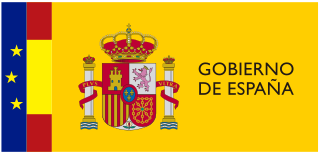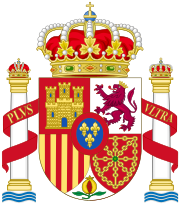
In modern politics, and history, a parliament is a legislative body of government. Generally, a modern parliament has three functions: representing the electorate, making laws, and overseeing the government via hearings and inquiries. The term is similar to the idea of a senate, synod or congress and is commonly used in countries that are current or former monarchies. Some contexts restrict the use of the word parliament to parliamentary systems, although it is also used to describe the legislature in some presidential systems, even where it is not in the official name.

The politics of Spain takes place under the framework established by the Constitution of 1978. Spain is established as a social and democratic sovereign country wherein the national sovereignty is vested in the people, from which the powers of the state emanate.

A speech from the throne, or throne speech, is an event in certain monarchies in which the reigning sovereign, or their representative, reads a prepared speech to members of the nation's legislature when a session is opened. The address sets forth the government's priorities for its legislative agenda, for which the cooperation of the legislature is sought. The speech is often accompanied by formal ceremony. It is often held annually, although in some places it may occur more or less frequently, whenever a new session of the legislature is opened.

The Spanish Constitution is the supreme law of the Kingdom of Spain. It was enacted after its approval in a constitutional referendum; it represents the culmination of the Spanish transition to democracy.

The Congress of Deputies is the lower house of the Cortes Generales, Spain's legislative branch, the upper house being the Senate. The Congress meets in the Palace of the Parliament in Madrid.

The Senate is the upper house of the Cortes Generales, which along with the Congress of Deputies – the lower chamber – comprises the Parliament of the Kingdom of Spain. The Senate meets in the Palace of the Senate in Madrid. The presiding officer of the Senate is the president of the Senate, who is elected by the members at the first sitting after each national election.

The State Opening of Parliament is a ceremonial event which formally marks the beginning of each session of the Parliament of the United Kingdom. At its core is His Majesty's "gracious speech from the throne", which is read by the monarch but written by HM Government. In the speech the monarch gives notice of forthcoming state visits, before setting out the government's legislative programme for the new parliamentary session. No business of either House of Parliament can proceed until the Sovereign’s speech has been delivered.

The Cortes Generales are the bicameral legislative chambers of Spain, consisting of the Congress of Deputies and the Senate.
The dissolution of a legislative assembly is the simultaneous termination of service of all of its members, in anticipation that a successive legislative assembly will reconvene later with possibly different members. In a democracy, the new assembly is chosen by a general election. Dissolution is distinct on the one hand from abolition of the assembly, and on the other hand from its adjournment or prorogation, or the ending of a legislative session, any of which begins a period of inactivity after which it is anticipated that the same members will reassemble. For example, the "second session of the fifth parliament" could be followed by the "third session of the fifth parliament" after a prorogation, but would be followed by the "first session of the sixth parliament" after a dissolution.

The Spanish Republic, historiographically referred to as the First Spanish Republic, was the political regime that existed in Spain from 11 February 1873 to 29 December 1874.

The government of Spain is the central government which leads the executive branch and the General State Administration of the Kingdom of Spain.

Prinsjesdag is the day on which the reigning monarch of the Netherlands addresses a joint session of the States-General of the Netherlands to give the Speech from the Throne, similar to the annual State of the Union in the United States or the British State Opening of Parliament. This speech sets out the main features of government policy for the coming parliamentary session.

The Congress of the French Parliament is the name given to the body created when both houses of the present-day French Parliament—the National Assembly and the Senate—meet at the Palace of Versailles to vote on revisions to the Constitution or to listen to an address by the President of the French Republic.

The inauguration of the president of Brazil is composed of several ceremonies that happen in the same day. Through democratic elections or coups, resignations and deaths, presidential inaugurations have been important events in Brazilian history.

The president of the Congress of Deputies is the speaker of the Congress of Deputies, the lower house of the Cortes Generales. The president is elected among the members of the Congress and is, after the king and the prime minister, the highest authority in the Kingdom of Spain.
The State Opening of Parliament includes a State Procession, a formal display of the Sovereign, dignified by a sizeable entourage made up of Great Officers of State and members of the Royal Household. The State Procession is now confined to the interior of the Palace of Westminster, but in earlier centuries it followed an outdoor route to and from Westminster Abbey.

The opening of the Parliament of Canada is the commencement of a session of the Parliament of Canada following a general election. It involves summons from the governor general on behalf of the monarch and a ceremony based on the same in the United Kingdom, though less elaborate and now evolved to include uniquely Canadian elements.

The Bureaus of the Cortes Generales are the governing bodies of each House of the Cortes Generales, the legislative branch of Spain. The Bureaus are made up of the President or Speaker of the House, the Vice Presidents or Deputy Speakers and the Secretaries. Each Bureau is regulated by the standing orders of its house.

Parliamentary groups in Spain are the institutionalisation or parliamentarisation, of political parties.
The Message to the Nation is a political tradition in Hispanic American countries that consists of a speech delivered by the head of state before a representation of the Nation in which the government is rendered accountable at the beginning of the new ordinary legislative period or extraordinary measures are announced.
















